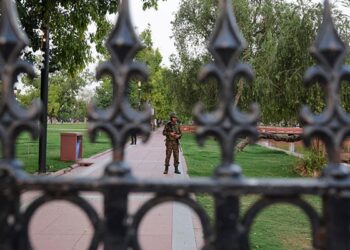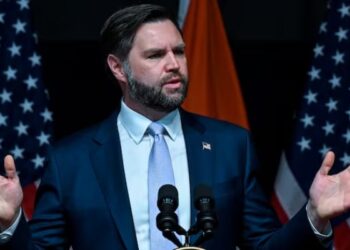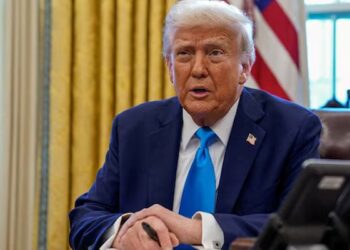- “Kashmir Resistance” claims the attack.
- Expresses anger over the settlement of over 85,000 “outsiders”.
- Trump offers full backing to India; PM Modi vows to seek justice.
SRINAGAR: In a tragic occurrence in Indian Illegally Occupied Jammu and Kashmir (IIOJK), Indian security forces began an extensive search on Wednesday for the assailants involved in the shooting that claimed the lives of 26 individuals at a popular tourist site. This incident marks the deadliest attack on civilians in nearly twenty years, prompting New Delhi to pledge a formidable retaliation.
The shooting, which occurred on Tuesday in the picturesque Baisaran valley of Pahalgam, also left at least 17 others injured. Reports indicate that the deceased included 25 Indian citizens and one Nepali national, according to police sources.
This attack represents the most significant assault on civilians since the 2008 Mumbai attacks and has disrupted the relative peace that has allowed tourism to flourish in IIOJK as anti-India insurgent activities have diminished in the past few years.
The incident is perceived as a blow to Prime Minister Narendra Modi and his Hindu nationalist Bharatiya Janata Party (BJP).
Modi returned early from a two-day visit to Saudi Arabia on Wednesday morning. Finance Minister Nirmala Sitharaman also shortened her trip to the U.S. and Peru to support the nation during this difficult period, as stated by her ministry.
At the airport, Modi convened a meeting with top officials, including the national security advisor and the foreign minister, while a special security cabinet session was scheduled for 12:30 GMT, according to a defense ministry source.
“We will pursue not only those who committed this act but also those who orchestrated it from the shadows,” declared Indian Defense Minister Rajnath Singh ahead of the meeting. “A decisive response will follow shortly,” he added during a memorial address for a former Indian Air Force chief.
Chasing the attackers
Immediately after the incident, security forces deployed to Pahalgam began searching the forests for any signs of the attackers. Security sources reported that about 100 individuals, believed to have had past affiliations with insurgents, were brought in for questioning.
Police also released sketches of three suspects, who were observed wearing traditional attire, including long shirts and loose trousers, with one reportedly sporting a body camera. At the time of the attack, around 1,000 tourists and approximately 300 local service providers were present in the valley, according to a security source.
A relatively unknown group, the “Kashmir Resistance,” has taken responsibility for the attack through a social media post, voicing dissatisfaction over the settlement of over 85,000 “outsiders,” which they claim has led to a “demographic shift.”
Pakistan’s foreign ministry spokesperson, Shafqat Ali Khan, expressed concern over the loss of tourist lives, extending condolences to the victims’ families and wishing a swift recovery to the injured.
Kashmir in protest
On Wednesday, numerous local organizations called for a shutdown in IIOJK in protest against the attack on tourists, whose increasing presence has bolstered the local economy.
Many schools also opted to suspend classes for the day in solidarity against the tragedy.
The shutdown was pervasive, with protesters emerging in various locations carrying banners with slogans like “Stop killing innocents,” “Tourists are our lives,” and “This is an attack on us.”
“I must convey to the nation’s citizens that we are embarrassed; Kashmir is ashamed,” said former Jammu and Kashmir Chief Minister Mehbooba Mufti in a statement. “We stand with you in this crisis.”
Airlines began offering additional flights from Srinagar, the territory’s summer capital, as visitors hurried to leave the region, officials reported.
“Witnessing this exodus of our guests is heartbreaking,” said serving Chief Minister Omar Abdullah on X, pointing out that the primary highway linking Srinagar with the rest of the country, which had been damaged by heavy rainfall, was opened for one-way traffic out of Srinagar to facilitate the departing tourists.
While some local tourism operators reported receiving cancellations for the approaching peak summer season, the local chapter of the Travel Agents Federation of India condemned the violence.
Trump pledges full support to India
U.S. President Donald Trump reached out to Prime Minister Modi to quickly offer “full support to India in seeking justice against the offenders of this horrendous attack.”
Among other international leaders condemning the assault, EU chief Ursula von der Leyen stated that “Europe stands with you.”
India maintains approximately 500,000 troops stationed in the territory. Over recent years, officials have worked to promote this mountainous area as a vacation hub, attracting visitors for both winter skiing and summer escapes from the heat experienced in other parts of India.
In 2024, Kashmir saw an influx of approximately 3.5 million tourists, predominantly local visitors.
The most devastating attack in recent history occurred in Pulwama in February 2019 when insurgents drove a vehicle loaded with explosives into a police convoy, resulting in the deaths of 40 individuals and injuring at least 35 others.
India revoked Kashmir’s special status in 2019, transforming the region into two federally governed territories—Jammu and Kashmir, and Ladakh. This move allowed local administrations to grant domicile rights to outsiders, enabling them to secure jobs and purchase land in the disputed region, thus straining relations with Pakistan. The ongoing conflict has fueled deep animosity and military confrontations between the two nuclear-armed nations.
Attacks targeting tourists in IIOJK have been infrequent. The last fatal incident occurred in June 2024 when a bus carrying Hindu pilgrims fell into a deep gorge following an attack, killing at least nine people and injuring 33 others.





